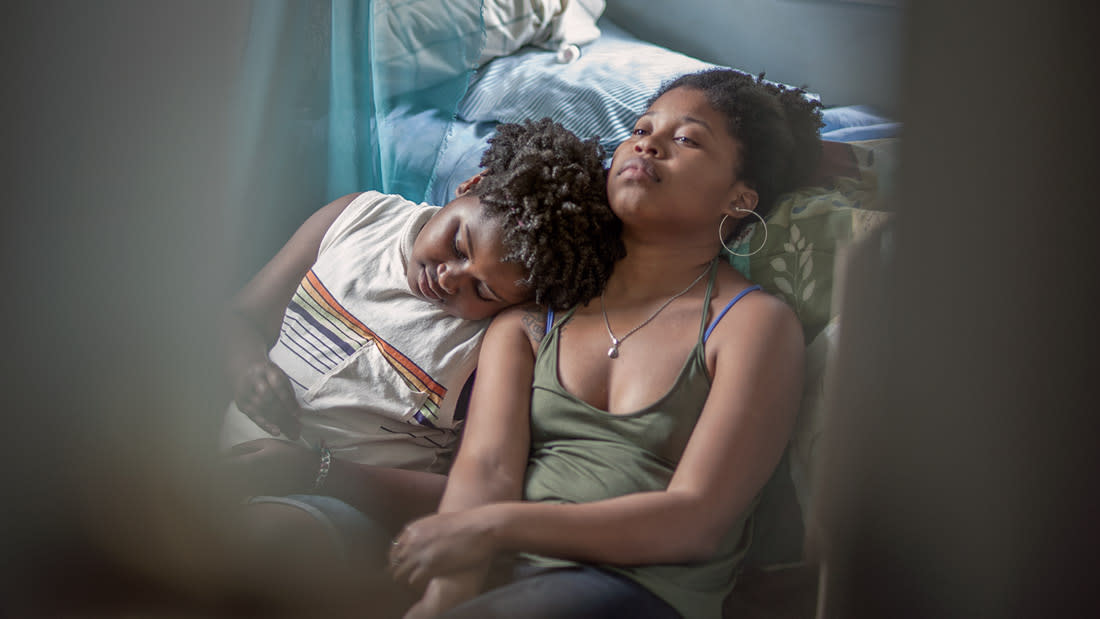Film Review: ‘Night Comes On’

“Dominique Fishback” is a name that sticks easily enough in the memory on its own catchy merits, but Jordana Spiro’s intimately accomplished debut feature “Night Comes On” provides viewers with yet another reason to file it for future reference: In her first big-screen showcase, the gifted young actress-playwright fixes the camera with a calm, confident stare, and has its undivided attention thereafter.
As a released juvenile offender torn between dueling urges for revenge and renewal in her first days as a free woman, Fishback brings a straight-no-chaser emotional gravity to Spiro and Angelica Nwandu’s tough, unadorned screenplay; her chemistry with bright discovery Tatum Marilyn Hall, as her equally lost, abandoned younger sister, lends the otherwise sparkle-free proceedings a particular magic. Select distribution should follow festival berths in Sundance and Rotterdam.
The harshness of the outside world to the recently incarcerated, for whom life has stalled while everything around them has moved on, is a well-scuffed starting point in cinema. It’s rarely a story that has been filtered through a black female gaze, however, and “Night Comes On” subtly but pointedly differentiates its perspective early on, noting in passing the myriad misunderstandings, microaggressions and instances of outright abuse making it that much harder for 18-year-old Angel (Fishback) to make her way after a spell in a Philadelphia juvenile detention center for illegal firearm possession. At her final, pre-release hearing, when the mitigating circumstances of her childhood sexual abuse are raised, an examiner blandly asks why she didn’t report it; young women like Angel are accustomed to being placed at fault in all circumstances.
A wistful introductory voiceover conjures a state of mind far from Angel’s rough concrete reality, as she reflects on the memory of her gentle mother — who herself advised her daughters to daydream of the ocean when life got a little too hard to handle. It’d take more beachy reverie than Angel can muster, however, to drown out the combination of tragedy and error that has befallen her, since her stony, unyielding father John (John Earl Jelks) killed her mother in a fit of fury — only to be released without charge. Angel leaves juvie determined to exact her own revenge on him, even if it means diving right back into criminal territory: The very first thing she acquires on the outside is a new gun from lecherous older acquaintance Marcus (Max Casella), in exchange for queasily non-monetary payment.
So far, so bleak, and things aren’t about to get better: Angel’s hopes to reunite with her girlfriend are summarily dashed, while her 10-year-old sister Abby (Hall) is unhappily languishing in a cramped foster home, the young wards of which receive distinctly unequal treatment. Getting a steady job is also on Angel’s to-do list, though her severe, straight-talking parole officer (a piercing cameo from erstwhile “NYPD Blue” star James McDaniel, sharp and ungiving as a pebble in your shoe) warns her against running before she can walk. Best, then, that he doesn’t know about her more immediate plan of action to reconnect with Abby, using her to locate John before blasting him into kingdom come.
That description — and, indeed, that baleful title — makes “Night Comes On” sound like a socially conscious update of such hardboiled on-the-warpath mood pieces as John Boorman’s “Point Blank” and Alan Rudolph’s “Remember My Name.” But while Spiro’s nervous, crackling atmosphere barely softens for a minute, the avenging Angel’s mission is a secondary narrative to that of two damaged sisters’ fraught, tender reunion, as they set off on a rogue, ill-planned trip to the Jersey Shore: En route, the two lonely, under-loved girls redefine the terms of their bond in light of the horrific family history that binds them.
There is no pat, one-hug-fixes-all redemption to be found here, as the script and stars alike delineate the compounded layers of hurt, distrust and neglect that has backed both Angel and Abby prematurely into separate corners of every-woman-for-herself solitude. Fishback, fresh from the vivid impression she made in HBO’s “The Deuce,” is a quiet storm at the film’s center, her body language at once vulnerably cautious and charged with latent violence. She moves with the slightly scratched swagger of an 18-year-old who has known more disappointment than most her age, but an 18-year-old nonetheless.
She and her younger co-star, meanwhile, watchfully reflect and echo other in ways that make the film’s sisterly relationship sing bittersweet and low. Next to the irresistible Hall, who persuasively essays the internally conflicted nature of an instinctively open child doing her best to be guarded, Angel seems almost a ghost of Christmas future. Shot with grainy, unhurried assurance and a bracing reliance on natural light by Hatuey Viveros Lavielle, “Night Comes On” is, true to its title, blanketed in a dim, crepuscular state of waiting. Fishback, her film career unfurling clearly before her from scene to scene, blazes a way out of it.
Related stories
Rotterdam Film Review: 'Insect'
Robyn Lively, Shanola Hampton to Star in Thriller 'Through the Glass Darkly'
Sundance Film Review: 'Westwood: Punk, Icon, Activist'
Subscribe to Variety Newsletters and Email Alerts!

